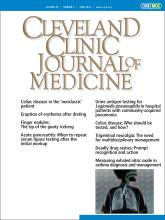Article Figures & Data
Tables
Test Sensitivity Specificity Advantages Disadvantages Culture 10%–80% 100% Detects all serogroups Results take several days, difficult technique Urine antigen 70%–80% > 99% Results in less than 1 hour Detects only Legionella pneumophila serogroup 1 Polymerase chain reaction 95%–99% > 99% Results in hours, detects all serogroups Availability may be limited in some areas Direct fluorescent antibody stain 25%–75% > 95% Results in hours, detects all serogroups Difficult technique Serology 80%–90% > 99% Detects all serogroups Must test acute-phase and convalescent-phase sera, results take several weeks Adapted from reference 13.
Atypical symptoms including but not limited to altered mentation, pleuritic chest pain, and diarrhea Admission to intensive care unit High-risk patient features including immunosuppression, chronic lung disease, history of smoking, and age older than 50 Hypoxemia and increasing oxygen requirements Recent travel (ie, within 2 weeks of initial presentation) Concern for community or nosocomial pneumonia outbreak






